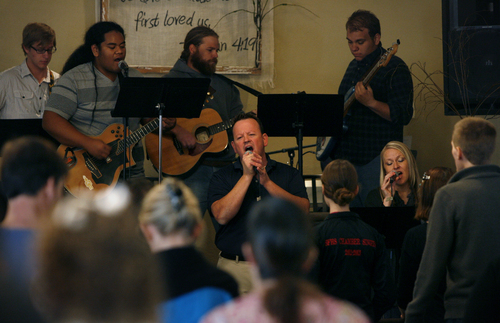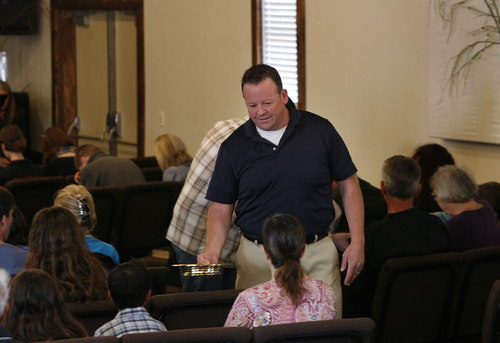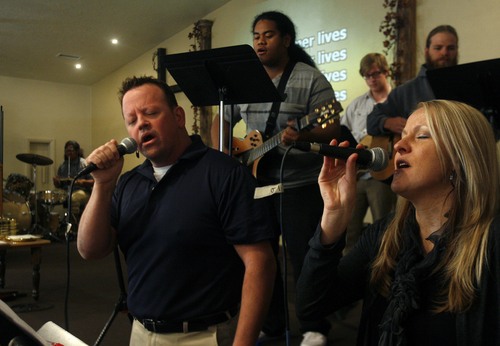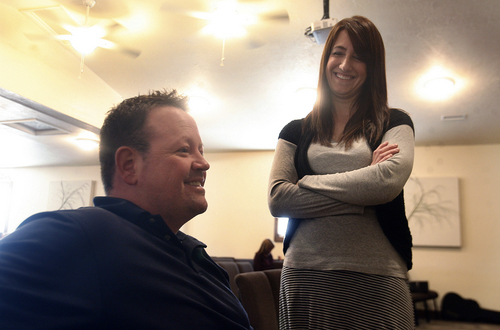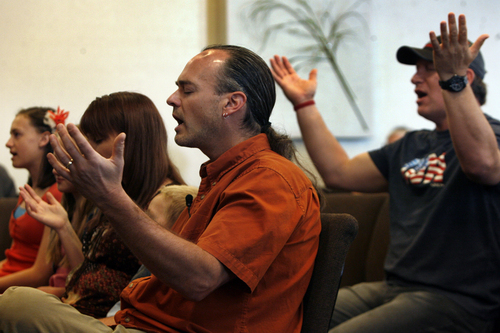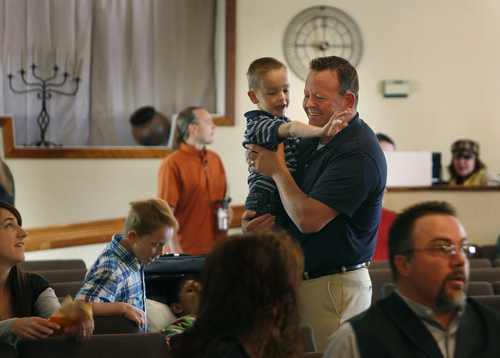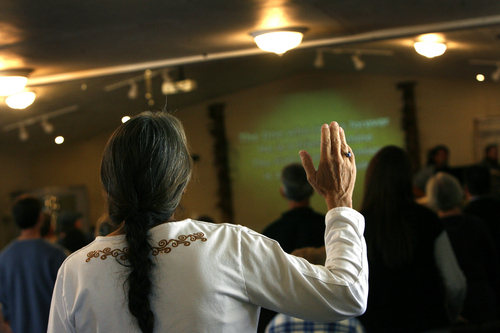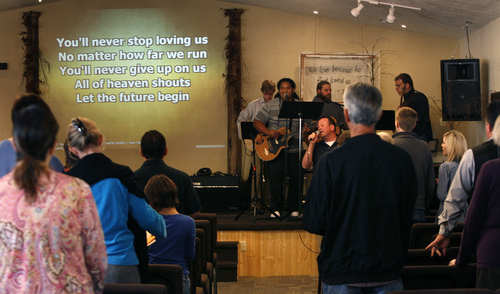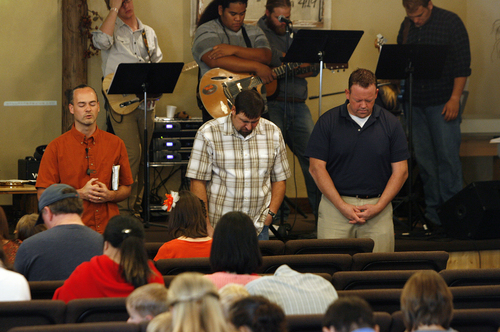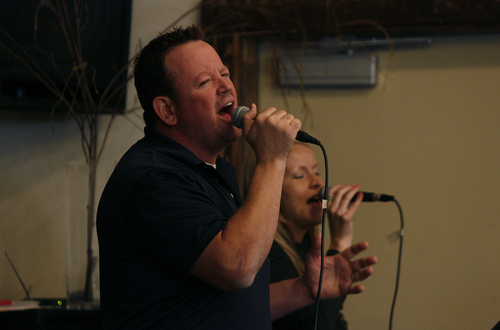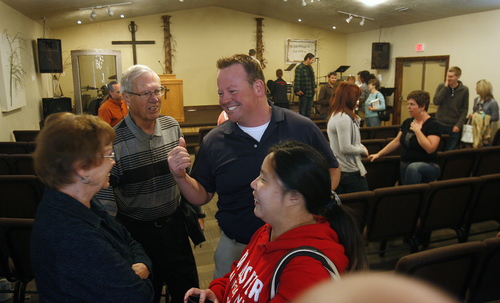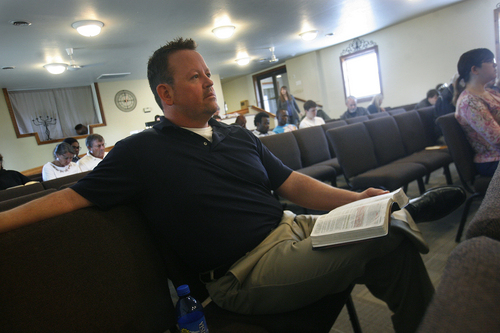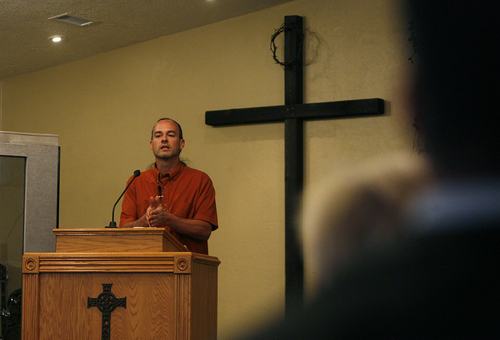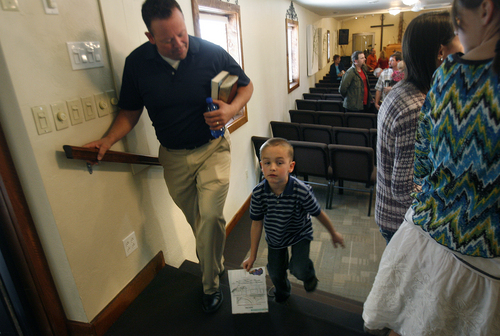This is an archived article that was published on sltrib.com in 2013, and information in the article may be outdated. It is provided only for personal research purposes and may not be reprinted.
Gunnison • Carl Wimmer felt on top of the world.
He was winning elections and making headlines as a conservative legislator at the center of many Utah political debates. He was the early front-runner for a newly created congressional seat. He was a four-time world powerlifting champ. He enjoyed being recognized on the street. He was happy in his Mormon faith.
Then it fell apart.
After resigning from the Legislature to run for Congress, he lost in spectacular fashion, failing to survive the GOP convention. After he announced that Nevada Republicans hired him as political director, the party said he was mistaken and dissidents had misled him. At the same time, his lifelong LDS faith was shaken as he discovered elements about its history and teachings that disturbed him.
Wimmer says the embarrassment and faith crisis were "as devastating as death," so he turned over his life to Christ.
That decision led him to tiny Gunnison, population 3,285, where he is a police school resource officer. He left Mormonism to become an evangelical Christian — many of whom don't view Latter-day Saints as Christians — with eyes on joining the ministry.
"My political friends were shocked and surprised," says Wimmer, grinning widely at his dining room table. "But I'm spiritually alive like I have never been in my life."
He adds, "All of that pain, all of that heartache, was washed away as I came to the reality of who Jesus is in my life. It's been replaced with a joy and a peace that surpass understanding."
—
Lifelong LDS • Wimmer says that unexpected spiritual journey to an unexpected place began about 10 years ago, although he didn't recognize it at first.
To understand it, realize that Wimmer and his wife, Sherry, were lifelong Mormons. They grew up in the same LDS ward, or congregation, in West Valley City.
"I was your very run-of-the-mill, straitlaced LDS kid," Wimmer recalls. "I was baptized at 8, deacon [a beginning position in the faith's all-male priesthood] at 12, teacher at 14, priest at 16 and elder. I didn't serve a mission because I wanted to be a police officer all of my life, so I chose to go to the police academy instead. We were married in the Bountiful Temple in 1998."
He was an elders quorum president for years, even as his Mormon ward in Herriman split several times because of rapid growth. Meanwhile, Sherry served in presidencies of the local Relief Society (for LDS women), Primary (for children) and Young Women (for teenage girls).
"We were very happy for a long time," Wimmer says. The Church of Jesus Christ of Latter-day Saints "played such a large part in molding the type of people we are today that we are grateful for it."
But small events started his path away from Utah's predominant religion.
"Just minor things, like a conversation you have with evangelicals that taught you something you didn't know before. Or you could read a scripture that didn't jibe with what you were taught and raised to believe," he says. "It slowly transformed to the point where it was hard to reconcile wanting to be a faithful follower of Jesus of the New Testament and some of the things we were doing in our church."
Helping the transition, Sherry Wimmer says, is the couple discovered Christian rock music, loved its messages and enjoyed going to concerts. Through politics, the Wimmers also became friends with many evangelicals.
Sherry became troubled that some New Testament teachings did not, in her view, match Mormon teachings.
For example, she says, the LDS Church teaches that to reach the highest level of exaltation in the celestial kingdom, or heaven, people must be married in Mormon temples and remain obedient. "Why am I dependent on Carl to be worthy for me to be exalted in the celestial kingdom? It's through Christ alone that I am saved," she says. "That was the biggie for me."
—
Guided by God • Amid that, Wimmer says he still reached a time as a legislator and congressional candidate that he was "riding high and loving it, loving the adoration, loving people recognizing me."
Then his congressional bid flopped. "I lost big. It wasn't even close. But even that wasn't enough to humble me. I just thought [the people] got it wrong."
Then came the debacle with the Nevada GOP, when it turned out the party had not hired him as he had announced.
"It was at that point that I got on my knees and said, 'OK, God, I get it. I am humbled. Do with me as you want,' " Wimmer says. "I said, 'You lead me where you want me to go. You're in control.' "
Wimmer talked to his LDS bishop and a pastor friend about several job possibilities. They advised him to pursue everything possible and "pray that God will open the door to the one he wants you to do. So we did."
He says obstacles blocked every prospect, except the job he thought was least likely: moving to Gunnison to work as a school resource officer. Besides their own three kids, the Wimmers have two special-needs foster children, who he assumed would be prevented from moving with them from Salt Lake County. "But every obstacle was torn down."
Sherry says it became obvious why Carl was sent there. "He started mentoring kids who came from broken homes and were suicidal, addicted to drugs, alcohol. Carl just developed such a great love for them. … This is why we were brought here: to help these kids."
—
Leaving one church • The Wimmers were still LDS, but continuing incidents and their studies fueled doubts until they decided to leave the Mormon faith.
"I heard a couple of things about the church that made me very upset and very defensive. It got my hackles up," Wimmer remembers. "And I thought, 'All right, I'm going to prove that person wrong because they are talking badly about the church I love, the LDS Church.' As I researched it, I proved them correct. That was a pretty big blow."
Wimmer declines to discuss precise problems he has with Mormonism, saying he doesn't want to be seen as someone attacking it. But to help understand his path, he says generally that he had problems with things such as Joseph Smith's claims about translating ancient papyrus resulting in the church's Book of Abraham and differing accounts the LDS founder gave about his "First Vision." (Mormons teach that God and Jesus appeared to Smith as a 14-year-old boy and told him to align with no religion and that Christ's true gospel would be "restored" to the Earth through him.)
"You didn't have to go to anti-Mormon material," Wimmer notes. "You could go directly to LDS sources to confirm loads of church history that nobody's taught."
Wimmer adds when he read that Hans Mattsson, a former LDS area authority in Europe, went public with how his faith was shaken by troubling facts about LDS history that he had not been taught, "We thought, 'We know where he's been because we went through the same thing.' "
—
Finding a new one • Wimmer says he again put himself in the Almighty's hand.
"In prayer, I told God, 'I just want truth. You show me truth, no matter where it is. You lead, we'll follow.' "
He started hearing about the nondenominational Ephraim Church of the Bible, 25 minutes away from his home in another small Sanpete County town. Research showed its beliefs matched his.
"It's very comparable to the Calvary Chapel churches," Wimmer says. "It's also comparable to the Baptists."
He went to talk to Pastor Rodney Zedicher.
"Within five minutes, I knew this was where my family needed to be," Wimmer says. "Everything was centered on our Savior. That, to me, was just refreshing."
The Wimmers soon asked the LDS Church to remove their names from its membership rolls. Sherry says the couple gave their children — ages 6 to 13 — the opportunity to continue to attend Mormon Primary meetings. But they decided to go to the new church with their parents.
They love it, Carl Wimmer says. "We thrive at church. We love Sunday mornings. The kids love going."
Wimmer also started studying for the ministry and has been taking online classes from Liberty University in Lynchburg, Va., whose chancellor is the Rev. Jerry Falwell Jr. He has another two years to finish a bachelor's degree in biblical studies.
"I had a lot of catching up to do when it came to knowledge about Jesus, the scriptures, the Bible," Wimmer says. An example of a change in thinking from his LDS days, he says was "before I was working for my salvation," believing his works were key to that and not just being saved by Christ. "Today I am working because I am grateful for my salvation."
Wimmer plans to work as a police officer for another eight to 10 years, but could start a part-time ministry on the side — or pursue a full-time one when he retires.
—
Going public by accident • Wimmer's exit from Mormonism occurred out of sight of many of his friends after he moved to Gunnison. It might have remained mostly unnoticed except that the area's legislator, Spencer Cox, was appointed as lieutenant governor — and speculation surfaced that Wimmer may seek his vacant seat in a return to Utah's Capitol Hill.
"My phone was exploding," Wimmer says, with people wondering if he would run. He posted on Facebook that he was considering it (but soon decided against it). The Salt Lake Tribune's Paul Rolly left a message for Wimmer, who assumed the columnist just wanted to ask if he planned to run. Rolly asked him about talk that he had left the LDS Church. Caught off guard, Wimmer confirmed it.
"I felt relieved because I felt like we could finally be free to share our testimonies," says Sherry (the couple have been doing so on their blog).
Reactions from others surprised Wimmer. He says only a small percentage were negative. Some speculated on social media that he left the LDS Church because he had been offended, had committed a major sin, had become a polygamist or couldn't live Mormon standards.
"That certainly is not the case for us at all," he says. "Most of it came from just a powerful strong pull and desire to follow Jesus Christ, to make him the center of our life, our faith, of everything we could be."
Wimmer was more surprised to be contacted by many Mormons who are having similar crises of faith over LDS teachings or history — and have lost all faith and belief in God. He says so many of them called that he is considering forming a future ministry targeting them.
"Just because you discover that what you were raised to believe is not correct does not mean there is not truth out there," he says. "And truth that is found in Jesus should never be discarded simply because you lose faith in a particular institution."
Waves of Mormons have been leaving the church after discovering information about their religion on the Internet. Emeritus LDS general authority Marlin Jensen called it a growing problem, one Mormon leaders are working to confront.
"The church is concerned about misinformation and distorted information," Jensen said last year. "But we are doing better and trying harder to get our story told in an accurate way."
—
Support abounds • Wimmer notes that most people, including Mormon friends, have been kind and supportive of the family's religious migration.
Sherry, for example, says her former LDS visiting teachers still drop by. The local Relief Society brought dinners when a child was in the hospital. Mormon leaders still invite their children to activities.
Rep. Keith Grover, R-Provo, a co-founder with Wimmer of the conservative Patrick Henry Caucus, commented on Wimmer's blog about his faith change by writing, "I don't know that it matters to me much, nor should it to others. … Each is to follow the path he/she feels is their path. That is the beauty of freedom!"
Former Rep. Ken Sumsion, R-American Fork, another co-founder of the Patrick Henry Caucus, says that, as a faithful Mormon himself, the change by Wimmer raises concerns. "But it won't impact our friendship in any way. We were friends before, and we will still be."
Looking back, Sherry Wimmer says she loves the changes she sees in her husband, who had the reputation of an in-your-face, aggressive politician. "Carl has been humbled a few times over. He is definitely more loving towards others. He has such a greater love and appreciation for what people are going through and their hardships."
About that, Wimmer adds, "I can honestly stand today and tell you I do not hate anybody. …That was not the case when I was in office, and I fear it would not be the case if I were in office again. That's something I just don't want to deal with. I don't want that in my life."
Wimmer says he similarly enjoys changes in his wife. "Before she was going through the motions spiritually. She had her little religious checklist. Go to church, check. Visit-teach, check. But she was spiritually dead, in a way. … Now I see her in a personal relationship with Jesus."
He adds something few politicians ever utter. "I'm really glad I lost my congressional race."
That defeat, Wimmer says, helped him "surrender" himself to Christ.
"Our lives have been beautiful since. It's been amazing."


